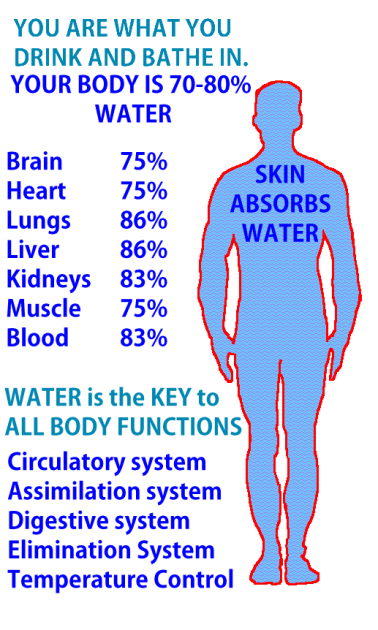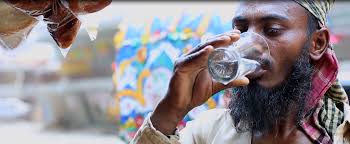Water, water every where, not a drop to drink. So said the mariner in the poem ,“Rhyme of the Ancient Mariner”. Water is one of the most important substances on earth. All plants and animals must have it to survive. Apart from drinking it people have many other uses for water. It makes up more than two thirds of human body weight, and without it, we would die in a few days. The human brain is made up of 95% water, blood is 82% and lungs 90%. A mere 2% drop in our body’s water supply can trigger signs of dehydration: fuzzy short-term memory, trouble with basic maths, and difficulty focusing on smaller print, such as a computer screen. Mild dehydration is also one of the most common causes of daytime fatigue.
Overall,the human body contains from 55% to 78% water, depending on body size. To function properly, the body requires between one and seven litres of water per day and to avoid dehydration the precise amount depends on the level of activity, temperature, humidity, and other factors. Most of this is ingested through foods or beverages other than drinking straight water. It is not clear how much water intake is needed by healthy people, though most specialists agree that approximately 2 litres (6 to 7 glasses) of water daily is the minimum to maintain proper hydration. Medical literature favours a lower consumption, typically 1 litre of water for an average male, excluding extra requirements due to fluid loss from exercise or warm weather. Your body uses water in all its cells, organs, and tissues to help regulate its temperature and maintain other bodily functions. Because your body loses water through breathing, sweating, and digestion, it’s important to re-hydrate by drinking fluids and eating foods that contain water.
On top of the vegetables list are cucumber and lettuce, consisting of 96% water. Zucchini, radish and celery are comprised of 95% water. 94% of tomato’s weight is water, and green cabbage is 93. Vegetables that contain 92% water include cauliflower, eggplant, red cabbage, peppers and spinach. Broccoli is 91% water by weight. Additional healthy hydrating foods include carrots with 87% water and green peas and white potatoes with 79% water. Watermelon and strawberries contain about 92% water per volume. Other fruits with high water content include grapefruit with 91%, cantaloupe with 90% and peaches with 88% water. Fruits containing 87% water by weight include pineapple, cranberries, orange and raspberries. Apricots hold 86% water, while blueberries and plums contain 85% water. The water content for apples and pears is 84%. Cherries and grapes contain an average of 81% water. And, a banana’s composition includes 74% water. After passing through the stomach, water enters the small intestine, where it is largely absorbed in the first sections, the duodenum and jejunum. The rest passes into the colon. It crosses the intestinal mucous membrane into the bloodstrea m, then into the interstitial tissues that make up the framework of every organ, to arrive in the cells.
m, then into the interstitial tissues that make up the framework of every organ, to arrive in the cells.
For those who have healthy kidneys, it is rather difficult to drink too much water, but (especially in warm humid weather and while exercising) it is dangerous to drink too little. People can drink far more water than necessary while exercising, putting them at risk of water intoxication (hyper-hydration), which can be fatal. The popular claim that “a person should consume eight glasses of water per day” seems to have no real basis in science. Studies have shown that drinking extra water at mealtime was conducive to weight loss. Adequate fluid intake is helpful in preventing constipation and gives the brain a boost
Water provides the brain with much needed oxygen to allow it to perform at optimum levels. Water helps you lose weight
by increasing your metabolic rate, thus helping your body burn fat. Dehydration is a huge cause of fatigue and drinking water can keep you alert and active during the day. Pregnant and breastfeeding women need additional fluids to stay hydrated and should drink up to 3 litres (12 cups) a day, since an especially large amount of fluid is lost during nursing. Also noted is that normally, about 20% of water intake comes from food, while the rest comes from drinking water and beverages .
Adequate water intake enables your body to excrete waste through perspiration, urination, and defecation. The kidneys and liver use it to help flush out waste, as do your intestines. Water can also keep you from getting constipated by softening your stools and helping move the food you’ve eaten through your intestinal tract. However, it should be noted that there is no evidence to prove that increasing your fluid intake will cure constipation. Digestion starts with saliva, the basis of which is water. Digestion relies on enzymes that are found in saliva to help break down food and liquid and to dissolve minerals and other nutrients. Proper digestion makes minerals and nutrients more accessible to the body. Water is also necessary to help you digest soluble fibre. With the help of water, this dissolves easily and benefits your bowel health by making well-formed, soft stools that are easy to pass.
Water is also essential for proper circulation in the body. The levels of oxygen in the bloodstream are greater when the body is well hydrated. The more oxygen the body has readily available the more fat it will burn for energy. Without the presence of oxygen the body cannot utilize stored fat for energy efficiently. Not only will the body burn more fat when well hydrated but because there are increased oxygen levels you will also have more energy. Water helps remove toxins from the body, in particular from the digestive tract. It suppresses the appetite naturally and helps the body metabolize stored fat. Studies have shown that a decrease in water intake will cause fat deposits to increase, while an increase in water intake can actually reduce fat deposits. Water also regulates the body’s cooling system. That is why we sweat when the temperature is high as this is the body’s way of cooling down. Dehydration can occur at any time of the year, not only during the summer months when it is hot. The dryness that occurs during winter can dehydrate the body even quicker than when it is hot and there is also a tendency to eat more when you are dehydrated. Consistent failure to drink enough water can lead to Chronic Cellular Dehydration. This condition, where the body’s cell are never quite hydrated enough, leaves them in a weakened state, vulnerable to attack from disease. It weakens the body’s overall immune system and leads to chemical, nutritional and pH imbalances that can cause a host of diseases.
Soft Drinks never quench your thirst, certainly not your body’s need for water.Soft drinks steal water from the body. They work very much like a diuretic which takes away more water than it provides.Just to process the high levels of sugar in soft drinks steals a considerable amount of water from the body and the elevated levels of phosphates in soft drinks also leach vital minerals from your body. A severe lack of minerals can lead to heart disease, osteoporosis and many other health issues. Most vitamins cannot perform their function in the body without the presence of minerals. The high amount of sugar in soft drinks will also cause your pancreas to produce an abundance of insulin, which leads to a “sugar crash”. Chronic elevation and depletion of sugar and insulin can lead to diabetes and other imbalance related diseases. This is particularly disruptive to growing children which can lead to life-long health problems. Drinking water will ward off symptoms of dehydration which are headaches, dizziness, tiredness, dry lips or eyes, dark coloured urine and infrequent urination.Soft Drinks are also EXTREMELY acidic, so much so that they can eat through the lining of an aluminium can and leach aluminium from the can if it sits on the shelf too long. Alzheimer patients who have been autopsied ALL have high levels of aluminium in their brains, some of which could have come from the aluminium in the cans.
As we get older, the amount of water in our body decreases, increasing the risk of dehydration, and the consequences thereof. Dehydration has been associated with increased mortality rates among older adults in hospitals and can precipitate emergency treatments and increase the risk of repeated stays in hospital. Evidence suggests high dehydration rates of elderly patients within hospitals and other health care institutions and dehydration has also been associated with various morbidities, such as impaired cognition or acute confusion, falling or constipation.The elderly are more susceptible to dehydration because the amount of body water decreases by approximately 15% between the ages of 20 and 80. With this decrease, the body becomes more susceptible to dehydration from the loss of a small amount of body water. Moreover, the elderly often experience diminished thirst sensation which leads to reduced fluid consumption. Also as a consequence of ageing, the kidneys have a reduced ability to concentrate urine and retain water during water deprivation. In addition, ageing kidneys are less able to conserve or excrete sodium.
Insufficient fluid intake can also be the result of limitations such as reduced swallowing capacity, decreased mobility, or comprehension and communication disorders,especially as we get older. Disease-related factors, such as incontinence can increase water losses. Dehydration may also be caused by warm temperature, inadequate staffing in institutions, or use of laxatives or diuretics. If you have an elderly relative, whether that person is being cared for by you or other family members or hospitalized try to ensure that they are properly hydrated as this could improve their quality of life in their senior years.
Disclaimer: The contents of this website are not intended to replace a one to one relationship with your health practitioner nor are they meant as medical advice. You are encouraged to do your own research and make your own decisions in partnership with your medical practitioner.
